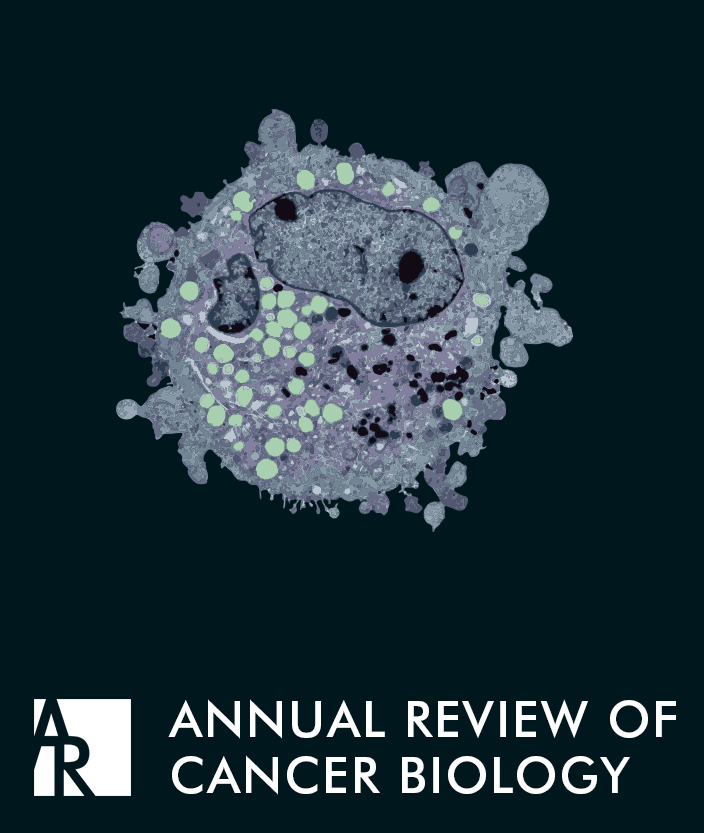癌症细胞衰老的有效性和悖论生物学
IF 4.7
2区 医学
Q1 ONCOLOGY
Annual Review of Cancer Biology-Series
Pub Date : 2023-01-17
DOI:10.1146/annurev-cancerbio-061421-124434
引用次数: 1
摘要
细胞衰老是一种肿瘤抑制程序,通过识别受损细胞进行免疫介导的清除来促进组织稳态。因此,逃避衰老和随后的免疫监视的能力是癌症的一个标志。衰老程序的重新激活可以导致免疫介导的肿瘤退化或使肿瘤对免疫治疗敏感,尽管衰老细胞的异常持续可以促进组织衰退并导致某些癌症治疗的副作用。在这篇综述中,我们首先简要地描述衰老作为肿瘤抑制程序的发现。接下来,我们强调衰老相关分泌程序(SASP)在癌症中的利弊,包括SASP依赖的免疫作用。然后,我们总结了癌症治疗诱导衰老的有益和有害影响,以及利用衰老治疗的发展策略。最后,我们强调了在了解癌症衰老和开发衰老调节疗法方面的挑战和未满足的需求。预计《癌症生物学年度评论》第七卷的最终在线出版日期是2023年4月。修订后的估计数请参阅http://www.annualreviews.org/page/journal/pubdates。本文章由计算机程序翻译,如有差异,请以英文原文为准。
The Potent and Paradoxical Biology of Cellular Senescence in Cancer
Cellular senescence is a tumor-suppressive program that promotes tissue homeostasis by identifying damaged cells for immune-mediated clearance. Thus, the ability to evade senescence and the ensuing immune surveillance is a hallmark of cancer. Reactivation of senescence programs can result in profound immune-mediated tumor regressions or sensitize tumors to immunotherapy, although the aberrant persistence of senescent cells can promote tissue decline and contribute to the side effects of some cancer therapies. In this review, we first briefly describe the discovery of senescence as a tumor-suppressive program. Next, we highlight the dueling good and bad effects of the senescence-associated secretory program (SASP) in cancer, including SASP-dependent immune effects. We then summarize the beneficial and deleterious effects of senescence induction by cancer therapies and strategies in development to leverage senescence therapeutically. Finally, we highlight challenges and unmet needs in understanding senescence in cancer and developing senescence-modulating therapies. Expected final online publication date for the Annual Review of Cancer Biology, Volume 7 is April 2023. Please see http://www.annualreviews.org/page/journal/pubdates for revised estimates.
求助全文
通过发布文献求助,成功后即可免费获取论文全文。
去求助
来源期刊

Annual Review of Cancer Biology-Series
Medicine-Oncology
CiteScore
14.50
自引率
1.30%
发文量
13
期刊介绍:
The Annual Review of Cancer Biology offers comprehensive reviews on various topics within cancer research, covering pivotal and emerging areas in the field. As our understanding of cancer's fundamental mechanisms deepens and more findings transition into targeted clinical treatments, the journal is structured around three main themes: Cancer Cell Biology, Tumorigenesis and Cancer Progression, and Translational Cancer Science. The current volume of this journal has transitioned from gated to open access through Annual Reviews' Subscribe to Open program, ensuring all articles are published under a CC BY license.
 求助内容:
求助内容: 应助结果提醒方式:
应助结果提醒方式:


